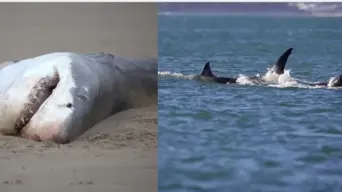WATCH: Orca's shark attack has 'world looking at South Africa'
An Orca (killer whale) took down a great white shark in under two minutes at Seal Island in Mossel Bay, here's why it's being classified as a "novel situation."

Lester Kiewit speaks to Marine Biologist, Doctor Alison Towner about the remarkable footage.
Recent footage shows a solo Orca Starboard killing a white shark, and moments later, surfacing near a tourist boat with the liver of the shark in his mouth in just under two minutes.
This took place near Seal Island in Mossel Bay - the story has crossed international waters, making headlines on BBC which means "the whole world is looking at South Africa right now and looking at the situation with high interest," says Towner.
Towner who's led many papers, including this one, on whales hunting these white sharks, says this incident reveals the realisation that the solitary hunting of white sharks at this speed is possible, highlighting the predatory proficiency of these incredible predators even more.
Another factor adding to this spectacular moment is that two male killer whales were hunting their prey when naturally females lead the hunt, impacting the ecology of killer whale culture, says Towner.
"This behaviour is being documented elsewhere but we've never seen it have such drastic impact as we have here because these two male killer whales are hunting in coastal environments and they're really impacting the ecology. We are left with lots of questions - one of them is why are two male killer whales doing this?"
Doctor Alison Towner, Marine Biologist
These factors contribute to this attack being classified "as a novel situation" says Towner.
"We always assumed that killer whales worked together to take down prey like a white shark and removing the liver so cleanly must've required team work but this shows that they are quite proficient in hunting on their own."
Doctor Alison Towner, Marine Biologist
Overall, it's a great time for whale science in South Africa.
"Lots more questions remain about the orca dynamics here in South Africa rather than the shark situation... it remains to be studied."
Doctor Alison Towner, Marine Biologist
Find the full study here.